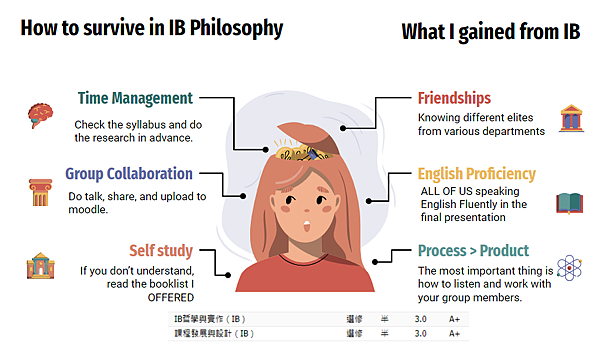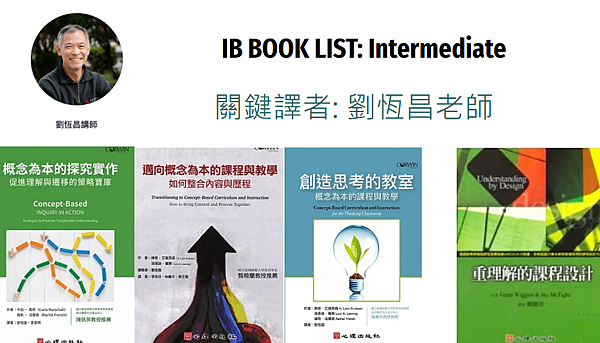IB 哲學與實作 ( IB Philosophy and Practices ) 個人覺得含金量很高,雖然老師在師大擔任教務長也是教育部委任負責高中以下國際教育的教授,但是老師每次來上課都是準備好的,從課程設計就可以看出來,不是照本宣科,而是透過設計不同活動讓學生從活動中學習,即使邀請講師來演講,也全程坐到尾,並給予意見,非常敬業。
本人很喜歡上課的小組,16週的課程會有四次分組,每次分組都會跟不同系的同學一起合作,了解不同專業, 讓我收益良多。認識了以前就算同一門課但是可能不熟的理工科同學,真的很奇妙呀~。

![]() 劉美慧教授
劉美慧教授
國立臺灣師範大學教務處教務長
國立臺灣師範大學教育學系教授
EMAIL: lium@ntnu.edu.tw
![]() 課堂作業 20%
課堂作業 20%

![]() 第二週作業
第二週作業
The definition of IB
IB: where FIRE Leaders were from
IB is the birthplace of all FIRE Leaders, who possess flexible, influential, responsible, and empathetic personalities. Thanks to these characteristics, they can stand out among their peers and become leaders on a global scale.
Firstly, in the IB system, students are taught to solve problems in various ways, which makes them highly adaptable when it comes to tackling questions with the resources at hand. Secondly, IB encourages students to be aware of global issues and to put their thoughts into practice, thus enabling them to become influencers capable of rallying like-minded individuals. Thirdly, IB is student-centered, requiring students to take responsibility for their own learning. Finally, the overarching goal of IB is to create a more peaceful world, placing a strong emphasis on empathy. Only by putting oneself in another's shoes can one truly devise better solutions to problems. In conclusion, IB serves as the breeding ground for flexible, influential, responsible, and empathetic leaders."
![]() 第四周個人作業
第四周個人作業
How IBMYP Acquiring Language facilitate International mindedness
"According to Savignon (1983), "Learning to speak another’s language means reaching out to others across cultural and linguistic boundaries. It is our most important link to the world around us. Language is culture in motion. It is people interacting with people." Therefore, we can find that IBMYP Acquiring Language facilitates international mindedness in the following ways.
First of all, students learn at least two languages in the MYP, allowing them to develop insights into different cultures and realize that there are diverse ways of living, behaving, and viewing the world. Thus, IBMYP encourages students to become multilingual, enabling them to discover the beauty of diverse cultures while maintaining their mother tongue and cultural heritage.
Secondly, IBMYP aims to develop students’ critical thinking skills and foster the growth of internationally minded and responsible members of local, national, and global communities. Students perceive themselves as global citizens, enhancing their abilities to communicate appropriately, accurately, and effectively in an increasingly wide range of social, cultural, and academic contexts.
In conclusion, IBMYP's commitment to teaching multiple languages not only fosters cultural understanding and appreciation but also equips students with the critical skills necessary to thrive as responsible global citizens in an increasingly interconnected world.
![]() 第九週作業
第九週作業
|
Know |
Wonder |
Learned |
|
Techers use assignments and formative assessments to support summative assessments. Summative assessment can be exam which were under highly controlled conditions to evaluate the best status of their performance. A good assessment supports teaching objectives, varies tasks, consider different types of leaner’s competences. |
I am still very curious about how to set up markscheme in the IB system. Does it evaluate them with holistic view which included academic writing, performance, and skills? Or it already has specific markscheme for different disciplines and learning level. And I really like the rubrics maker website which offered clear view of how to write markscheme. |
Formative assessments help the teacher to monitor students’ progress and identify areas where students may need additional supports. Backward Design is goal-oriented which has three stages. Firstly, established goal which are transferable big ideas. Secondly, set up the evidence of evaluation. Finally, set up learning experience and activities like WHERETO. |
![]() 個人作業 40%
個人作業 40%
1. Theory and Praxis of IB philosophy (2500-3000字) 30%
![]()
2. workshop learning journal 5 + 5 %
![]() 1107 TOK (TOK metacognitive journey)
1107 TOK (TOK metacognitive journey)
A Journey to Find Real Knowledge
In the intricate world of TOK, an IB requirement demanding a significant investment of time and effort, the pursuit of understanding takes center stage. Our recent TOK workshop served as a crucible of experience, blending discussion, lecture, and hands-on learning. This reflection delves into the essence of TOK, exploring the definition of knowledge, the transformative journey it has spurred, and the unique learning experiences encountered.
The Definition of Knowledge
Bacon's assertion that "Knowledge itself is power" encapsulates the traditional view, while Merriam-Webster offers a nuanced definition linking knowledge to facts acquired through study, investigation, observation, or experience. Teacher Dandi's perspective, however, shifts the focus to the process of knowing, urging students to delve into various areas of knowledge. TOK discussions, as she posits, should unravel the distinct character of each knowledge domain, fostering a holistic understanding.
Before and After
In the Taiwanese academic landscape, knowledge often feels like an encumbering burden, tested through written exams with limited real-world applicability. However, the IB approach, exemplified by Teacher Dandi's tasks, introduces a refreshing paradigm. Through metaphors and practical scenarios, students are encouraged to make abstract ideas concrete, relatable, and interconnected. This transformative shift not only bridges the gap between theory and application but also cultivates a multifaceted perspective, evident in the evaluation of assessments from both scientific and humanistic viewpoints.
How Did I Learn?
As a self-professed traditional learner, accustomed to reading and note-taking, the abstract and universal nature of IB's TOK posed a formidable challenge. Teacher Dandi's probing questions disrupted my conventional learning approach, emphasizing knowledge questions that transcend subject-specific boundaries. This shift towards inquiry and critical thinking illuminated the essence of TOK—questioning not just what we know, but how we know it. In this journey, I discovered that the process of thinking and inquiry holds more significance than the final outcome.
In conclusion, TOK serves as a conduit to real knowledge, challenging conventional learning paradigms and encouraging a holistic understanding of the world. Through defining knowledge, navigating transformative experiences, and reshaping learning methodologies, the journey reveals that the true power of knowledge lies not just in possessing it but in the continuous pursuit of understanding.
![]() 1128 ATL
1128 ATL
Assignment: ATT & ATL Change Journal
Educator: Navigating Current Educational Trends
I. Introduction
“Teach for future and the future is now.” This well-known slogan has resonated across various educational platforms. It emphasizes that educators who evolve with contemporary educational trends are less susceptible to being replaced by emerging technologies such as artificial intelligence (AI). We, Educators should transform into different teaching methods with the current educational trends. This change journal involves documenting experiences, insights, and transformations of this lecture.
II. From Initial Teaching Approach to IB ATT& ATL
Working in the public educational system, our primary goal is to increase admission rates. We have established specific objectives and designed numerous formative assessments to assess students’ understanding. However, while some students succeed, others lose motivation for learning. There are voices advocating for change, suggesting the implementation of a new educational system like IB. The mission of IB is to develop inquiring, knowledgeable, and caring young people who contribute to creating a better and more peaceful world through intercultural understanding and respect. IB aims to help students become effective learners by cultivating thinking skills, research skills, communication skills, self-management skills, and social skills. Besides, IB sets up principles and strategies that guide educators in creating a positive and effective learning environment. The Approaches to Teaching encompass a range of strategies that encourage critical thinking, inquiry-based learning, and the development of key skills.
Ⅲ. Time to change and put it into practice
To establish a student-centered classroom, collaboration and differentiation are essential. Firstly, teachers cultivate a collaborative learning environment where students engage in joint projects and tasks. They guide students to enhance their communication and teamwork skills. For instance, we utilize reader theater or role play as alternatives to oral quizzes, ensuring active involvement and high motivation for every student. Secondly, teachers acknowledge and address the diverse learning needs of students by adapting teaching methods to accommodate various learning styles and abilities. For instance, we establish different criteria for success to assist students in clarifying their goals and provide support to help them achieve those goals.
IV. Reflections and Personal and Professional Growth
During the workshop, Mrs. Yang utilized various group discussions and tasks, creating a comfortable and reliable atmosphere with my teammates. She guided us using real examples and experiences. Despite the abstract and challenging nature of inquiry and concepts, especially in designing lesson plans for IB students, we could clearly discern the distinctions between an IB school and a traditional one. This led us to aspire for a similar change in public schools. Consequently, we believe that both inquiry-based teaching and concept-based teaching must be incorporated into our instructional practices.
Firstly, inquiry-based teaching places a strong emphasis on student engagement in the learning process through questioning, investigation, and exploration. It nurtures critical thinking, problem-solving skills, and a sense of curiosity. In this approach, teachers serve as facilitators, guiding students through the inquiry process. Secondly, concept-based teaching revolves around central ideas or overarching concepts that connect various topics across different subjects. Teachers aim to deepen students' understanding and promote knowledge transferability. This approach seeks to foster a more interconnected and holistic comprehension of the material.
V. Conclusion Pedagogical Philosophy
In conclusion, the transformative journey from an initial teaching approach to embracing IB's Approaches to Teaching and Approaches to Learning (ATT & ATL) underscores the dynamic nature of education. The commitment to evolving with contemporary trends, documented in this change journal, emphasizes the pivotal role of educators in shaping the future. As we advocate for a shift towards student-centered classrooms, collaboration, and differentiation, we recognize the imperative to cultivate a positive and effective learning environment. Through reflections on workshops and the integration of inquiry-based and concept-based teaching, the pursuit of a holistic pedagogical philosophy becomes evident. This journey signifies not only personal and professional growth but also a dedication to creating engaged, thoughtful, and globally-minded learners poised for the challenges of tomorrow.
![]() 小組合作教案 40%
小組合作教案 40%
如果你修了ib 課程發展與設計,你就會發現寫起來很得心應手。畢竟是寫過的東西,其他就是小組配合就好。
報告的時候,每個小組只有10分鐘,所以一個人大約只有兩到三分鐘,可以呈現自己的部分,老師都會事先看過妳們提交的教案,所以教學內容不用太仔細,主要是大概念的分享就好。在此提醒,報告的時候,不要因為東西多,講話語速就快,這樣反而會讓自己的呈現不清楚。重點是: 把自己的部分,找出重點中的重點,條列或是圖示呈現就好。此外,期末報告也會有小組互評的部分,老師會提供鉅細靡遺的RUBRIC,讓小組討論後給分。因此,每個小組報告完,會有3分鐘的討論,3分鐘老師回饋,兩分鐘小組回饋,剩下的時間,也會即時邀請同學問問題

雖然一組只有十分鐘報告,但是不用怕自己小組的心血毀在口頭報告表達上,因為老師會事先鉅細靡遺的先詳細閱讀過你們的教案,並且給出精闢的回饋,所以真的不用太擔心;也因此,報告就是報告重點就好

![]() 書單推薦
書單推薦







 留言列表
留言列表